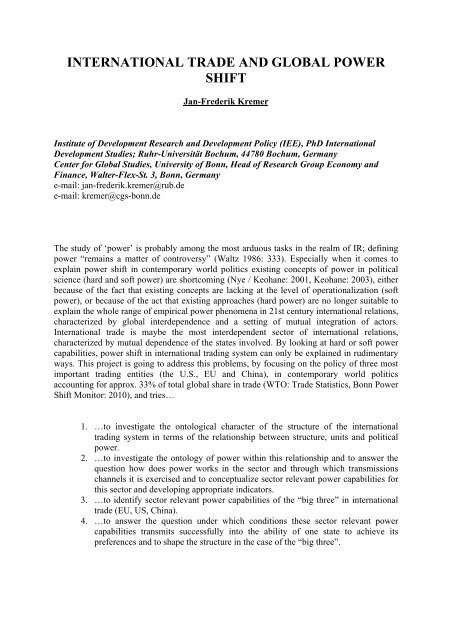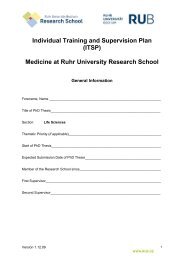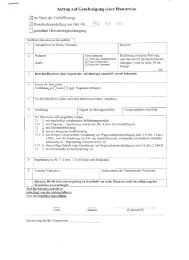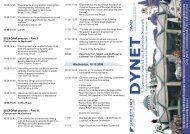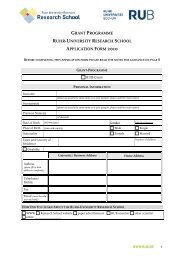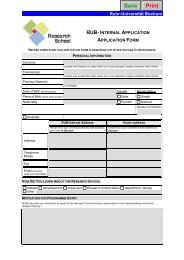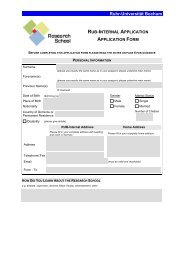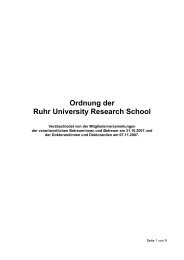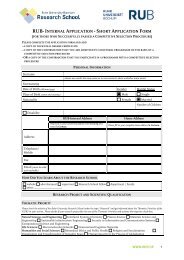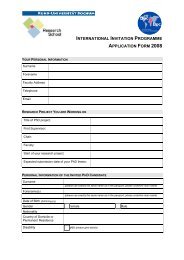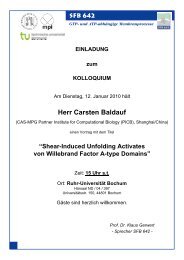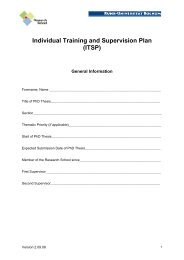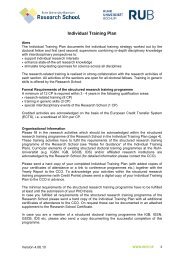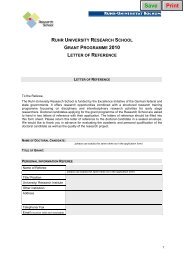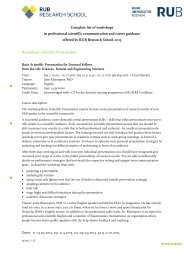Section Days abstract book 2010.indd - RUB Research School ...
Section Days abstract book 2010.indd - RUB Research School ...
Section Days abstract book 2010.indd - RUB Research School ...
Create successful ePaper yourself
Turn your PDF publications into a flip-book with our unique Google optimized e-Paper software.
INTERNATIONAL TRADE AND GLOBAL POWER<br />
SHIFT<br />
Jan-Frederik Kremer<br />
Institute of Development <strong>Research</strong> and Development Policy (IEE), PhD International<br />
Development Studies; Ruhr-Universität Bochum, 44780 Bochum, Germany<br />
Center for Global Studies, University of Bonn, Head of <strong>Research</strong> Group Economy and<br />
Finance, Walter-Flex-St. 3, Bonn, Germany<br />
e-mail: jan-frederik.kremer@rub.de<br />
e-mail: kremer@cgs-bonn.de<br />
The study of ‘power’ is probably among the most arduous tasks in the realm of IR; defining<br />
power “remains a matter of controversy” (Waltz 1986: 333). Especially when it comes to<br />
explain power shift in contemporary world politics existing concepts of power in political<br />
science (hard and soft power) are shortcoming (Nye / Keohane: 2001, Keohane: 2003), either<br />
because of the fact that existing concepts are lacking at the level of operationalization (soft<br />
power), or because of the act that existing approaches (hard power) are no longer suitable to<br />
explain the whole range of empirical power phenomena in 21st century international relations,<br />
characterized by global interdependence and a setting of mutual integration of actors.<br />
International trade is maybe the most interdependent sector of international relations,<br />
characterized by mutual dependence of the states involved. By looking at hard or soft power<br />
capabilities, power shift in international trading system can only be explained in rudimentary<br />
ways. This project is going to address this problems, by focusing on the policy of three most<br />
important trading entities (the U.S., EU and China), in contemporary world politics<br />
accounting for approx. 33% of total global share in trade (WTO: Trade Statistics, Bonn Power<br />
Shift Monitor: 2010), and tries…<br />
1. …to investigate the ontological character of the structure of the international<br />
trading system in terms of the relationship between structure, units and political<br />
power.<br />
2. …to investigate the ontology of power within this relationship and to answer the<br />
question how does power works in the sector and through which transmissions<br />
channels it is exercised and to conceptualize sector relevant power capabilities for<br />
this sector and developing appropriate indicators.<br />
3. …to identify sector relevant power capabilities of the “big three” in international<br />
trade (EU, US, China).<br />
4. …to answer the question under which conditions these sector relevant power<br />
capabilities transmits successfully into the ability of one state to achieve its<br />
preferences and to shape the structure in the case of the “big three”.


